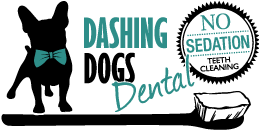Why clean my pet’s teeth? Just like humans, pets build plaque and calculus on their teeth over time. While we can brush our teeth to maintain oral hygiene, our pets depend on us to help them keep their teeth clean. Dental health is a crucial yet often overlooked aspect of pet care. Plaque buildup, if left untreated, can lead to gum disease, tooth loss, and other severe health issues. Unfortunately, once gum recession occurs, it cannot grow back. In this comprehensive guide, we’ll explore why cleaning your pet’s teeth is essential, the risks of neglecting dental hygiene, and how regular brushing and professional cleaning services, such as those offered by Dashing Dogs Dental, can help maintain your pet’s dental health.
1. The Importance of Pet Dental Care
-
Plaque and Calculus Formation
-
Just like in humans, pets accumulate plaque and calculus on their teeth over time. Plaque is a soft, sticky film that contains bacteria, and if not removed, it hardens into tartar or calculus. This buildup can cause several dental issues, from bad breath to severe gum disease.
-
-
Health Risks of Poor Dental Hygiene
-
Gum Disease: The most common dental issue in pets is periodontal disease, which can lead to inflammation, infection, and ultimately tooth loss if not addressed.
-
Systemic Health Issues: Dental disease in pets has been linked to other health problems, such as kidney disease, heart disease, and liver problems. Bacteria from the mouth can enter the bloodstream, affecting organs throughout the body.
-
-
How Regular Brushing Helps
-
Regular brushing is the most effective way to prevent plaque buildup. Brushing your pet’s teeth can help eliminate food particles and bacteria that lead to plaque and tartar formation. By maintaining a regular dental care routine, you can significantly reduce the risks of oral diseases.
-
2. Signs That Your Pet Needs Dental Care
-
Bad Breath: If your pet has persistent bad breath (also known as halitosis), it could be a sign of underlying dental issues.
-
Red or Swollen Gums: Gums that appear red, swollen, or bleed easily are often indicators of gum disease.
-
Tartar and Plaque: A yellow or brown buildup on your pet’s teeth is a clear sign that plaque and tartar have formed.
-
Difficulty Eating or Drooling: Pets with dental issues may struggle to eat, chew properly, or may drool excessively.
-
Changes in Behavior: If your pet becomes irritable, avoids being touched around the face, or experiences noticeable discomfort, it could be due to oral pain.
3. The Role of Professional Teeth Cleaning for Pets
-
Why Choose Professional Cleaning?
-
While regular at-home brushing is important, professional cleaning by a trained expert is often necessary to remove stubborn plaque and tartar that brushing alone can’t address. Services like Dashing Dogs Dental specialize in non-invasive cleaning using a hand scaler to remove plaque, revealing your pet’s pearly whites.
-
-
Non-Sedation Approach at Dashing Dogs Dental
-
Unlike other services, Dashing Dogs Dental uses an all-natural, non-sedation approach. Our technique ensures that your pet’s teeth are cleaned without the risks associated with sedation. This method allows your pet to enjoy a quick, effective dental cleaning session with no recovery time needed afterward.
-
The procedure usually takes about an hour, and there is no need for your pet to recover from the effects of sedation, making it a stress-free experience.
-
4. The Benefits of Regular Dental Cleanings
-
Prevents Tooth Loss
-
Regular professional cleanings help prevent the buildup of plaque and tartar, reducing the risk of tooth decay and tooth loss.
-
-
Fewer Visits to the Veterinarian
-
By maintaining your pet’s oral health, you can potentially reduce the number of expensive visits to the veterinarian for dental issues and treatments.
-
-
Improved Overall Health
-
Oral health is closely linked to your pet’s overall well-being. By preventing dental disease, you are also reducing the risk of systemic diseases like heart disease and kidney issues.
-
-
Fresh Breath
-
One of the immediate benefits of a professional dental cleaning is fresh breath. By removing plaque and tartar, your pet’s mouth will smell cleaner and healthier.
-
5. How Often Should You Clean Your Pet’s Teeth?
-
Daily Brushing at Home
-
To maintain optimal oral health, it’s recommended to brush your pet’s teeth daily. While this may not always be feasible, brushing at least 2-3 times a week can make a significant difference in their dental health.
-
-
Professional Cleanings
-
Professional cleanings should be performed at least once a year, or more frequently if your pet is prone to dental problems. Regular check-ups with your veterinarian can help determine the appropriate cleaning schedule.
-
6. How Dashing Dogs Dental Helps Keep Your Pet’s Teeth Clean
-
Our Approach to Pet Dental Care
-
At Dashing Dogs Dental, we provide a safe and effective method to clean your pet’s teeth without the need for sedation. We use a hand scaler to carefully remove plaque and tartar from your pet’s teeth. This non-invasive technique ensures that your pet experiences minimal stress and discomfort.
-
-
Why Choose Us?
-
All-Natural Approach: We use an all-natural method, ensuring no chemicals or sedation are involved in the cleaning process.
-
Time-Efficient: Your pet’s teeth will be cleaned in approximately one hour, and there’s no recovery time required, as we don’t sedate your pet.
-
Experienced Team: Our team is skilled in handling pets with care, ensuring that your pet’s experience is comfortable and stress-free.
-
-
Additional Services
-
Along with dental cleaning, Dashing Dogs Dental also offers a variety of grooming services, making us your one-stop shop for pet care. We ensure that your pet not only looks good but feels great, with a complete grooming and dental care regimen.
-
7. At-Home Tips for Maintaining Your Pet’s Dental Health
-
Brushing Your Pet’s Teeth
-
Use a pet-safe toothbrush and toothpaste to brush your pet’s teeth at home. Make sure to introduce the brushing process slowly, allowing your pet to get used to the sensation.
-
-
Dental Chews and Toys
-
Dental chews and toys can help remove plaque and tartar while keeping your pet entertained. Choose products that are specifically designed to improve oral health.
-
-
Regular Vet Checkups
-
Make sure to schedule regular checkups with your vet to monitor your pet’s dental health and address any emerging issues before they become serious.
-
8. The Consequences of Neglecting Your Pet’s Dental Health
-
Expensive Treatments for Advanced Dental Issues
-
Neglecting dental care can result in costly treatments later on. Pets with severe dental issues may require extractions, root canals, or other intensive procedures.
-
-
Pain and Discomfort for Your Pet
-
Dental problems can be very painful for pets. Infected gums, cavities, and loose teeth cause discomfort and can affect your pet’s overall quality of life.
-
-
Reduced Lifespan
-
Chronic dental disease can shorten your pet’s lifespan. By caring for their teeth, you help ensure they live a longer, healthier life.
-
9. Prioritize Your Pet’s Dental Health Today
Regular dental care is an essential part of your pet’s overall health. By brushing your pet’s teeth at home and scheduling regular professional cleanings at Dashing Dogs Dental, you’re ensuring that they maintain a healthy, happy mouth for years to come. Not only will this help prevent painful dental conditions, but it will also contribute to their overall well-being, preventing issues that may affect other organs. Prioritize your pet’s dental health today and give them the care they deserve!
Frequently Asked Questions (FAQ)
1. Why is it important to clean my pet’s teeth?
Cleaning your pet’s teeth is crucial for preventing dental diseases like gum disease, plaque buildup, and tooth loss. Just like humans, pets can develop oral health issues that affect their overall well-being. Regular cleaning helps maintain healthy teeth and gums, preventing pain, infections, and more serious health problems like heart or kidney disease.
2. How often should I brush my pet’s teeth?
Ideally, you should brush your pet’s teeth daily to prevent plaque buildup. However, brushing 2-3 times a week can still help maintain dental health. If your pet has a history of dental issues, daily brushing is recommended.
3. Can I use human toothpaste to clean my pet’s teeth?
No, you should never use human toothpaste for pets. Human toothpaste contains fluoride, which is toxic to animals if swallowed. Always use toothpaste specifically formulated for pets, which is safe to ingest and designed to help break down plaque and tartar.
4. What are the signs that my pet needs dental care?
Common signs that your pet may need dental care include:
-
Bad breath (halitosis)
-
Red, swollen, or bleeding gums
-
Yellow or brown buildup on teeth
-
Difficulty chewing or drooling excessively
-
Change in behavior (irritability, avoiding face touch)
5. What happens if I neglect my pet’s dental care?
Neglecting your pet’s dental care can lead to serious health issues, including gum disease, tooth loss, and infections. Bacteria from the mouth can spread to other organs, such as the heart, kidneys, and liver, causing further complications. Dental issues can also cause your pet significant pain and discomfort.
6. Is professional dental cleaning necessary for pets?
Yes, professional dental cleaning is recommended to remove plaque and tartar that cannot be addressed with home brushing alone. While regular brushing is important, professional cleanings help prevent more serious dental problems by removing hardened plaque and checking for underlying issues.
7. Why is Dashing Dogs Dental’s approach better than others?
Dashing Dogs Dental offers a non-sedation approach to cleaning your pet’s teeth. Our expert team uses a hand scaler to remove plaque and tartar safely without the need for anesthesia. This minimizes stress and eliminates recovery time, making it a safe and effective option for your pet.
8. How long does the dental cleaning process take?
The entire dental cleaning process at Dashing Dogs Dental takes about an hour. Since we don’t sedate your pet, there’s no recovery time required, and your pet can resume normal activities right after the cleaning.
9. Can I clean my pet’s teeth at home?
Yes, you can clean your pet’s teeth at home using pet-safe toothbrushes and toothpaste. Regular brushing is one of the best ways to maintain your pet’s oral health. Be sure to introduce your pet to brushing slowly, and reward them for good behavior to make the process easier.
10. What are some at-home alternatives to brushing my pet’s teeth?
If brushing is not possible, consider using dental chews, toys, or wipes designed to reduce plaque and tartar buildup. These products can complement brushing and help maintain oral health. However, they should not replace regular brushing or professional cleanings.
11. What if my pet resists brushing their teeth?
If your pet resists tooth brushing, try introducing the process slowly. Start with lifting their lips and getting them used to the sensation. You can also reward them with treats after each session to create positive associations. If your pet continues to resist, consider seeking professional advice or trying other dental products, such as wipes or sprays.
12. When should I start cleaning my pet’s teeth?
It’s ideal to start cleaning your pet’s teeth as early as possible, even when they are a kitten or puppy. Early exposure to dental care can make the process easier as they grow. For adult pets, it’s never too late to begin a dental care routine.
13. Are there any risks involved with professional pet dental cleaning?
At Dashing Dogs Dental, our non-sedation cleaning method eliminates the risks associated with anesthesia. Our process is safe, and we ensure that your pet experiences minimal stress or discomfort. If your pet requires more extensive care, we’ll advise you on the best course of action.










